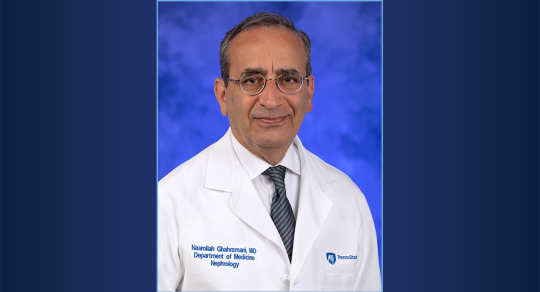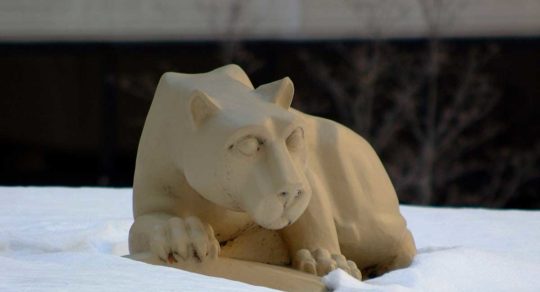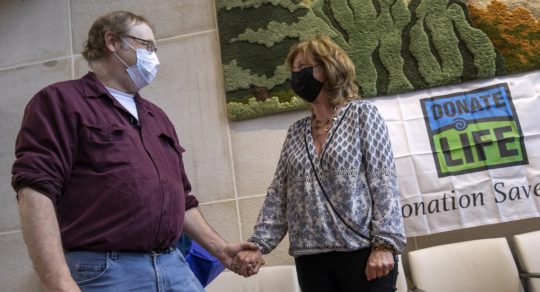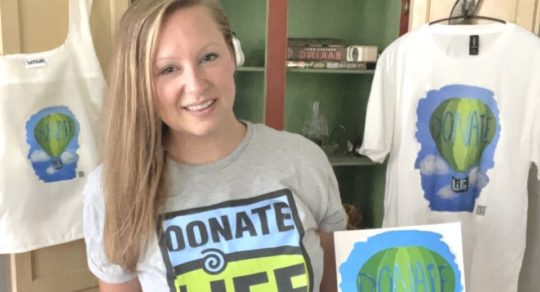Fellowship
Nephrology
The Nephrology Fellowship at Penn State Health Milton S. Hershey Medical Center is a two-year, ACGME-accredited program that admits two fellows per year.
Explore More
Penn State Health Milton S. Hershey Medical Center’s Nephrology Fellowship prepares the trainee for clinical or academic adult nephrology. The program also trains clinician-scientists to become competitive clinical researchers.
The program provides trainees with state-of-the-art training in both clinical and research pathways. Training is conducted on the campus of Penn State Health Milton S. Hershey Medical Center, a quaternary-care institute that cares for patients with a broad spectrum of pathologies. The campus offers a colocation of basic, translational and clinical science, patient care and Penn State College of Medicine. The program is designed to meet all requirements for board eligibility in nephrology upon completion.
Clinical training covers a full array of experiences in dialysis, renal transplantation, hypertension, inpatient service, consultation service and outpatient and long-term follow-up activities. All modalities of dialysis are available, including in-center and home hemodialysis, acute hemodialysis, chronic peritoneal dialysis and continuous renal replacement therapy.

Program Overview
Combined with the well-rounded clinical training is a rigorous didactic learning environment. The fellowship has many active research projects. Some topics of interest include inflammation and diabetic nephropathy, the natural history of acute kidney injury, a peer-led mentoring program for patients with chronic kidney disease and their caregivers, geographic disparities in kidney disease management, tissue plasminogen activator in renal fibrosis and genetics in acute kidney injury.
Learn More about the Fellowship
Robust training in transplant nephrology with a multidisciplinary team approach
Apheresis training with opportunity for credentialing in therapeutic apheresis
Extensive exposure to critical care patients, particularly in the heart and vascular ICU
An emphasis on peritoneal dialysis in both clinical and didactic settings
Simulation lab training in central line placement
PA-run ESRD service and PA coverage for inpatient fellow during continuity clinic
Weekly protected scholarly activity half-day
Consistent annual abstract submission to the American Society of Nephrology
Financial support for national conference attendance
Participation in the Mid-Atlantic Fellowship Boot Camp
General Application Information
Two fellowship openings are available each year. Fellowship applications are accepted through ERAS starting July 1. Interviews take place from August through early November. Match results are available in December.
Submission of complete ERAS applications by July 1 is highly recommended. The program only supports J-1 visas.
Application Requirements
Applicants must be in an ACGME or ACGME-I residency program, and will need to have passed all three USMLE steps before starting fellowship. Exceptional non-ACGME candidates will be considered.
Application requirements include:
Three letters of recommendation
A personal statement describing the applicant’s goals in nephrology
USMLE transcript
If applicable, ECFMG status report
ERAS application
What makes a competitive applicant varies between programs, but successful fellows tend to demonstrate:
A solid breadth and depth of internal medicine knowledge
Mature clinical decision-making
Interest and ability in research (even if that isn’t their career goal)
Calm professionalism
A genuine drive to become excellent nephrologists
Leadership


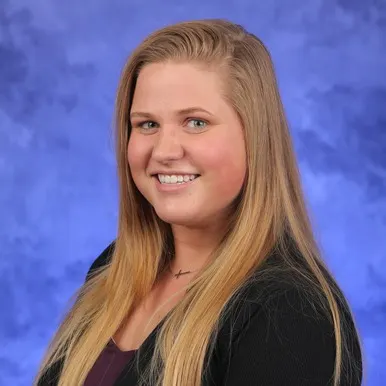
Program Coordinator, Gastroenterology and Hepatology Fellowship, Nephrology Fellowship and Rheumatology Fellowship, Medicine
Supporting Your Training
Curriculum Details
The inpatient consult service sees patients with acute renal failure, electrolyte and acid-base disorders and severe hypertension, as well as following end-stage renal disease patients requiring hemo- or peritoneal dialysis. The program maintains a teaching service census of approximately 20-40 patients, with two to five new consults per day. Critically ill patients in intensive-care settings (MICU, SICU, heart and vascular ICU, neuro ICU and associated intermediate-care units) make up a third to half of a typical census. Fellows supervise and teach residents and students on the service, with additional support from two physician assistants.
Training in transplantation is conducted at Penn State Health Milton S. Hershey Medical Center and UPMC Harrisburg. Experience with new transplants (50 to 60 per year) occurs in Harrisburg, and chronic clinic exposure along with a transplant biopsy conference and HLA conference occur in Hershey. Fellows also see long-term follow-up transplant patients as part of their continuity clinic. The exposure to patient selection, advanced immunosuppressant therapies, post-transplant management and long-term follow-up ensures that the fellow has a superior skill set in dealing with transplant patients in both in- and outpatient settings.
A cadre of 40 hemodialysis patients make up the core of the fellows’ outpatient hemodialysis experience. Fellows see approximately 10-15 patients in the peritoneal dialysis clinics monthly. The program provides an extensive amount of peritoneal dialysis training to fellows, which enables them to not just be competent in that modality, but to advance the cause of peritoneal dialysis after fellowship. Fellows have the opportunity to attend a national extramural course in peritoneal dialysis as well, further expanding their abilities.
The fellows’ continuity clinic is held weekly. Fellows will see one to two new and four to six follow-up patients per clinic along with the attending. As a referral center, the outpatient patient mix includes both common (CKD, hypertension), advanced (renal transplant, CKD in other solid organ transplant patients) and unusual cases (atypical or complex glomerular disease presentations).
Fellows have the opportunity for elective rotations in critical-care nutrition (TPN management), pediatric nephrology, renal imaging and intervention and renal pathology. A stone clinic, co-managed with nephrology and urology, is available for fellow exposure to the metabolic evaluation and treatment of nephrolithiasis. Each fellow will rotate on the apheresis service, and will be able to gain qualification in therapeutic apheresis such that, post-fellowship, they would be qualified to be a medical director of an apheresis service per the American Society for Apheresis guidelines.
The first year of training is heavily concentrated on inpatient consult service, with some exposure to transplant and outpatient dialysis. The second year brings more longitudinal exposure to chronic in-center hemodialysis and peritoneal dialysis. Research time is spread throughout the year to allow the fellow to initiate and complete a meaningful project. Depending on the interests and goals of the fellow, projects are possible in both basic and clinical science.
A goal of this activity is a peer-reviewed manuscript, or other scholarly output at that level. Past fellows have had poster and oral presentations at national meetings; submitted peer-reviewed publications; written successful IRB protocols; and obtained extramural grant funding.
While not all fellows plan to pursue clinical research after fellowship, motivated and skilled trainees will find challenging research work that can form the basis for further exploration.
Conferences are scheduled throughout the year, with specific sessions in July and August set aside for orientation topics. Fellows participate in planning and giving talks to the division, with additional time for this in the second year. The yearly renal medicine course for first-year medical students offers additional opportunities for small-group session teaching and facilitation.
Scheduled conferences include:
Clinical case conference (each Thursday, noon)
Weekly conference (Tuesdays, 4 p.m.; topics rotate weekly)
Basic science
Grand rounds
Biopsy conference
Literature update
Monthly departmental research conference
Core curriculum (Tuesday, noon) with emphasis on:
Renal physiology (spans both years)
Physiology of hemo- and peritoneal dialysis
Continuous CRT Lecture Series
K/DOQI and NephSAP review
Transplant conferences
Transplant biopsy conference (every other Friday afternoon)
HLA meeting
Vascular access conference (third Wednesday of each month)
ACGME Core Competencies conference (first Thursday of each month)
Morbidity and Mortality (M and M) Conference (third Wednesday of each month)
Program Director Dr. Ronald Miller shares a recommended article for fellows each week, along with his thoughts about the implications of the research.
Fellow Honors and Recognitions
Penn State College of Medicine and Penn State Health Milton S. Hershey Medical Center accept ongoing nominations for the Exceptional Moments in Teaching award.
The award, given monthly by the Office for a Respectful Learning Environment, accepts nominations from College of Medicine students who are invited to submit narratives about faculty members, residents, fellows, nurses or any other educators who challenge them and provide an exceptional learning experience. .
Previous nominees from the Nephrology Fellowship are listed here.
June 2023: Mohammad Gul Yousef Khan
Nominator Statement: Dr. Khan is the best teacher I have had the opportunity to work with during medical school. He spent time explaining various Nephrology concepts in detail and encouraged me to research interesting topics related to our patients. He helped me develop my skills in note writing as well as clinical decision making. He set an excellent example as a caring, kind, and professional healthcare worker. He gave me tips on how to succeed during internal medicine residency which I will be starting in a few months.”
May 2023: Sundus Sardar, MD
Nominator Statement Dr. Sardar was a great leader for the team. The expectations were always very clear because of her organization. Not only that, but she was always receptive to questions and would spend a considerable amount of time teaching. So much of the knowledge that I acquired from my nephrology rotation was thanks to her efforts. She cultivated a welcoming learning environment for learners of all levels. She printed out handouts to help us think through the differential diagnosis for hypokalemia. Walked us through an interesting case regarding Sjogren's, metabolic acidosis, hypokalemia, and renal tubular acidosis. Went above and beyond to help us feel supported and was always willing to answer questions. Dr. Sardar is the best fellow I've worked with thus far during my medical education.
November 2022: Sundus Sardar, MD
Nominator Statement: Dr. Sardar was incredible to work with. She was engaging with the students and all members of the team. She was helpful in discussing treatment plans and eager to help students learn. She took time to review common conditions and workup in an effective manner that I will remember and apply to other rotations
March 2021: Muhammad Abdulbasit, MD
Nominator Statement Dr. Basit was very responsive to our interests and goals as 4th year students allowing us to see the consults that were relevant to our own interests. He offered teaching point on lots of patients while being a busy fellow, writing notes, answering pages and talking on the phone throughout all morning. He still made time to offer us teaching sessions and frequently asked us what we wanted to learn more about so that he could offer more teaching. Also, he created a very supportive and comfortable learning environment on the team which is part of why I learned so much from him.
Previous oral and poster presentations from the Nephrology Fellowship are listed here.
A selection of recent peer-reviewed publications with Nephrology Fellowship trainees as authors appears here.
General Contact Information
Phone: 717-531-8156
Fax: 717-531-6776
